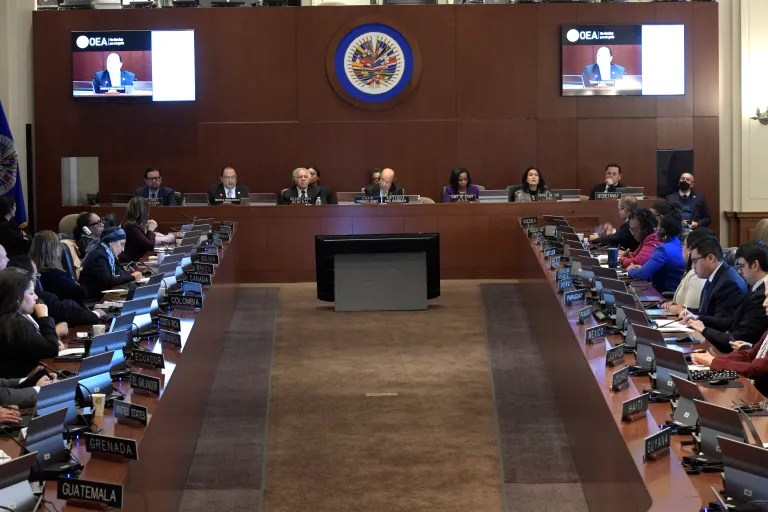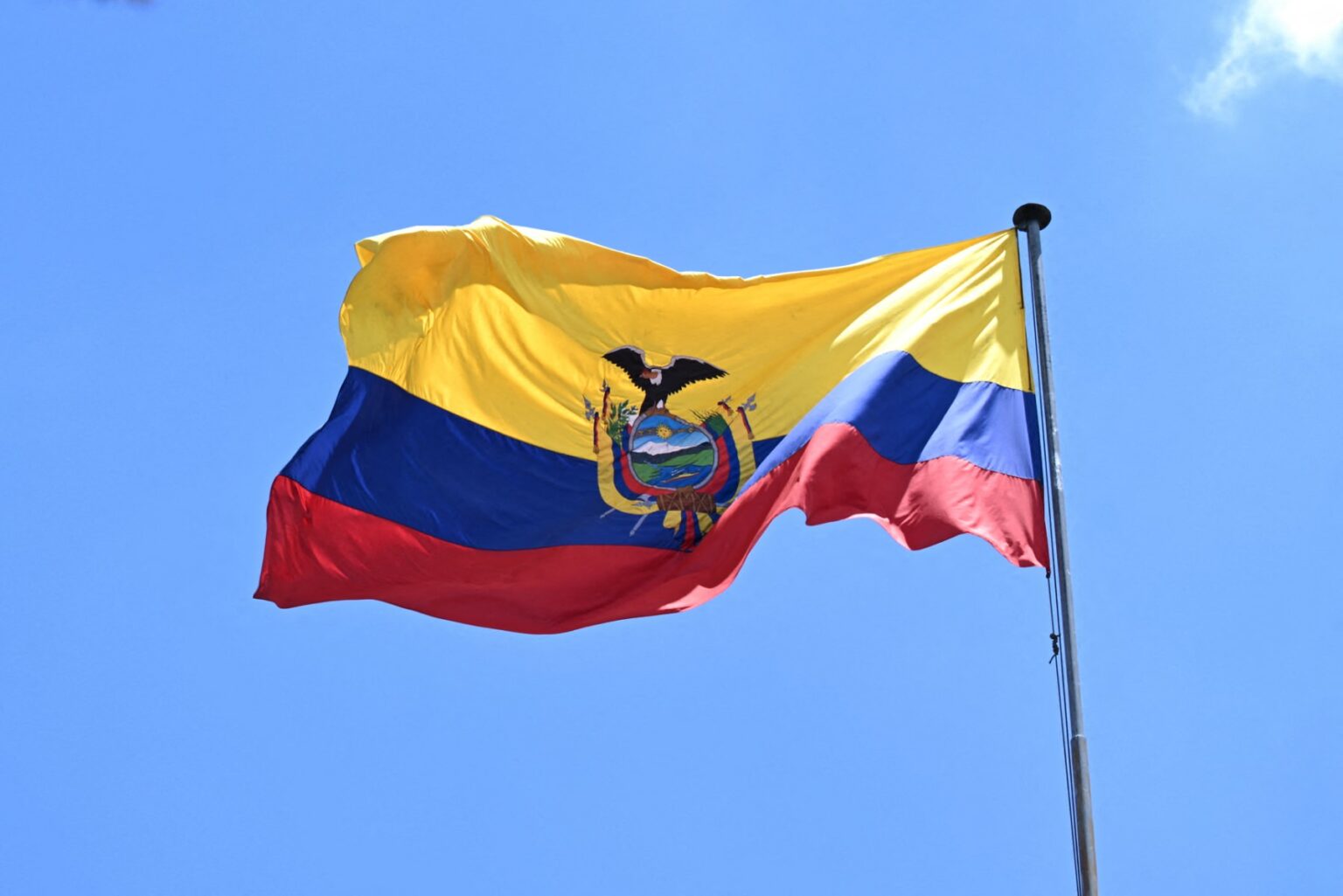International
The OAS convenes an extraordinary meeting to address the electoral process in Venezuela

The Organization of American States (OAS), based in Washington, convened an extraordinary meeting to discuss the results of the elections in Venezuela, questioned by the Venezuelan opposition and several countries in the region.
The session of the Permanent Council, which will take place on Wednesday, was convened at the request of twelve member countries, including all the Latin American governments that the president of Venezuela, Nicolás Maduro, ordered today to withdraw their diplomatic staff in Caracas.
So far, the organization has not pronounced on the elections, amid the rejection by the international community and the Venezuelan opposition on the results delivered by the National Electoral Council (CNE) that gave victory today to the president of Venezuela, Nicolás Maduro.
Hours earlier, the governments of Uruguay, Argentina, Costa Rica, Ecuador, Guatemala, Panama, Paraguay, Peru and the Dominican Republic expressed their deep concern about the development of the presidential elections in Venezuela and called for an urgent meeting of the Organization of American States (OAS).
In a joint statement, the countries demand the complete review of the electoral results and emphasize the need for the presence of independent electoral observers to ensure respect for the will of the Venezuelan people, who participated massively and peacefully in the elections.
“The vote count must be transparent and the results should not cast doubt,” the statement says.
Faced with the situation, the governments of these countries announced that they will request an urgent meeting of the Permanent Council of the Organization of American States (OAS) with the aim of issuing a resolution that safeguards the popular will, framed in the Democratic Charter and the fundamental principles of democracy in the region.
With this call to the OAS, the aforementioned countries seek to ensure that democratic values are respected and a fair and transparent electoral process is guaranteed in Venezuela. The signatories consider the intervention of the OAS to resolve the situation and maintain democratic stability in the region to be crucial.
The joint statement reflects the growing international concern about the situation in Venezuela and the determination of these governments to take concrete measures to ensure that the will of the Venezuelan people is respected and that democratic principles prevail.
In its first report, the National Electoral Council (CNE) gave the president of Venezuela, Nicolás Maduro, as the winner with 51.20% of the votes, compared to 44.20% of the opponent Edmundo González Urrutia, with 80% counted.
Opposition leader María Corina Machado said that the “new president-elect” is the candidate of the Democratic United Platform (PUD) block, since, she said, with more than 40% of the minutes transmitted by the electoral body, she obtained 70% of the votes, while Maduro, 30%.
For its part, the Government of Peru expelled the Venezuelan diplomats accredited in Peru and gave them a maximum period of 72 hours to leave the country.
The Ministry of Foreign Affairs said in a statement that this measure was ordered by the Peruvian Foreign Minister, Javier González-Olaechea, “due to the serious and arbitrary decisions taken today by the Venezuelan regime.”
He added that González-Olaechea “has instructed that the accredited Venezuelan diplomatic functions in Peru be notified that they must leave the country within no more than 72 hours.”
The decision was announced hours after the Government of Venezuela demanded from Argentina, Chile, Costa Rica, Peru, Panama, the Dominican Republic and Uruguay “the immediate withdrawal of their representatives in Venezuelan territory,” in rejection of their “interrenistic actions and statements” about Sunday’s presidential elections.
The Executive of Nicolás Maduro also indicated in a statement that he has decided to “withdraw all diplomatic personnel from the missions” in these seven Latin American countries.
This was due to what he considered “the interference actions and statements of a group of right-wing governments, subordinate to Washington and openly committed to the most sordid ideological postulates of international fascism, (…) that pretend to ignore the electoral results.”
On Monday, the Governments of Uruguay, Argentina, Costa Rica, Ecuador, Guatemala, Panama, Paraguay, Peru and the Dominican Republic expressed their deep concern about the development of the elections in Venezuela, for which they demanded the complete review of the results and called for an urgent meeting of the Organization of American States (OAS).
The National Electoral Council (CNE) officially proclaimed Maduro as the winner on Monday, after he announced on Sunday night that he obtained 51.2% of the votes, the same result that he gave when 80% of the minutes had been counted and in the absence of more than two million votes to count.
For his part, the candidate of the majority opposition, Edmundo González Urrutia, obtained 44.2% of the votes, according to the first and only public report of the CNE, which did not specify which candidates have gone to the 2,394,268 votes that were not reported.
International
Colombia to Send High-Level Delegation to Ecuador to Ease Trade Tensions

Colombia’s Ministry of Foreign Affairs confirmed on Friday that, at the instruction of President Gustavo Petro, a high-level delegation will travel to Ecuador in an effort to normalize bilateral relations, which have deteriorated following the imposition of reciprocal tariffs.
“In line with Colombia’s policy of good neighborliness and the spirit of cooperation and integration that guides its foreign policy,” the Foreign Ministry said in a statement, adding that the delegation will be led by Foreign Minister Rosa Villavicencio and Defense Minister Pedro Sánchez.
“Following instructions from the Presidency of the Republic, and as has been publicly reiterated, the Colombian delegation expects to reaffirm Colombia’s offer of support to the Republic of Ecuador to strengthen control over phenomena stemming from transnational organized crime,” the statement said.
The Foreign Ministry noted that the delegation will attend the meeting with a full willingness to engage in dialogue and to seek concrete solutions to the unilateral measures that have affected the longstanding relationship between the two neighboring countries.
Trade tensions between Ecuador and Colombia escalated on January 21, when Ecuadorian President Daniel Noboaimposed a 30% tariff on Colombian products, citing a lack of cooperation in anti-drug efforts. Colombia responded with similar measures and the suspension of energy exports, while Ecuador increased transportation costs for Colombian crude oil.
Business associations in both countries have warned that the dispute is harming both economies and have called on the governments to resolve their differences through dialogue.
International
Super Bowl Halftime Show Puts Bad Bunny—and Immigration Politics—Back in the Spotlight

The long-standing argument that sports and politics should not mix may be put to the test on Sunday during the Super Bowl halftime show, which will be headlined by Puerto Rican superstar Bad Bunny, a choice that has sparked backlash from segments of the U.S. right wing.
Just one week after his headline-making appearance at the Grammy Awards—where he sharply criticized the United States’ anti-immigration policies—Bad Bunny will once again take center stage on the global spotlight with his performance at the NFL final in Santa Clara, California.
Beyond the expectations surrounding the show itself, speculation has grown over whether the artist could again use the platform to protest policies associated with the administration of former President Donald Trump, in front of an audience expected to exceed 120 million viewers in the United States alone.
In fact, one of the most popular Super Bowl prop bets this year revolves around whether the Puerto Rican singer will deliver a direct message against ICE (U.S. Immigration and Customs Enforcement), similar to the one he delivered at the Grammys last Sunday.
While few expect Bad Bunny to repeat such a pointed statement, the mere speculation highlights the delicate balance the NFL must manage during the most-watched broadcast of the year.
The world’s most powerful sports league has drawn criticism from the MAGA movement since announcing in September that Bad Bunny would headline a halftime show largely performed in Spanish.
Trump himself declined to attend the matchup between the New England Patriots and the Seattle Seahawks, despite having made history last year as the first sitting U.S. president to attend a Super Bowl. He described the musical lineup—which also includes outspoken critics such as Green Day—as “a terrible choice” that would “sow hatred.” In response, his supporters have organized an alternative event dubbed the “All-American Halftime Show,” featuring like-minded artists such as Kid Rock.
International
Venezuela Debates Broad Amnesty Law Covering 27 Years of Chavismo

Venezuela’s Parliament began debating on Thursday a sweeping amnesty bill that would cover the 27 years of Chavismo in power, while explicitly excluding serious human rights violations and crimes against humanity.
The proposed legislation, titled the “Amnesty Law for Democratic Coexistence,” was introduced by interim President Delcy Rodríguez, who assumed power following the capture of Nicolás Maduro during a U.S. military operation.
The legislative session was convened for Thursday afternoon, with lawmakers holding an initial discussion focused on the general principles of the bill. This phase precedes a consultation process with civil society, after which the proposal will move to a final debate examining each article individually.
According to a draft of the bill obtained by AFP, the amnesty would apply to individuals accused of crimes such as “treason,” “terrorism,” and “incitement to hatred,” charges that were frequently brought against political prisoners over the past decades. The scope also includes offenses ranging from acts of rebellion to punishments imposed for social media posts or messages sent through private messaging services.
The bill’s explanatory text emphasizes reconciliation, stating that it seeks to move away from “vengeance, retaliation, and hatred” in favor of “opening a path toward reconciliation.”
However, the proposal explicitly excludes from its benefits crimes such as “serious human rights violations, crimes against humanity, war crimes, intentional homicide, corruption, and drug trafficking.”
These exclusions, the text notes, are based on strict compliance with the Venezuelan Constitution, which already prohibits granting amnesties or pardons for such offenses.
-

 International5 days ago
International5 days agoEpstein Denies Being ‘the Devil’ in Newly Released Video Interview
-

 International4 days ago
International4 days agoDelcy Rodríguez Takes Control of Chavismo as Venezuela Enters a U.S.-Supervised Transition
-

 International5 days ago
International5 days agoHypothermia Linked to Most Deaths During New York’s Recent Cold Spell
-

 International4 days ago
International4 days agoHRW Warns Trump’s Influence Has Weakened Human Rights in Latin America
-

 International3 days ago
International3 days agoDíaz-Canel Calls for Talks With Washington Without Pressure as U.S. Tightens Oil Sanctions
-

 Central America3 days ago
Central America3 days agoPanama Will Not Be Threatened, President Says Amid Rising Tensions With China
-

 International3 days ago
International3 days agoVenezuela Debates Broad Amnesty Law Covering 27 Years of Chavismo
-

 International2 days ago
International2 days agoColombia to Send High-Level Delegation to Ecuador to Ease Trade Tensions
-

 Central America3 days ago
Central America3 days agoBukele’s Approval Rating Climbs to 91.9% in El Salvador, Survey Shows
-

 Central America19 hours ago
Central America19 hours agoSalvadoran fans plan birthday surprise for Shakira at historic show
-

 Sports16 hours ago
Sports16 hours agoShakira ignites El Salvador with near sold-out residency at Mágico González Stadium
-

 International2 days ago
International2 days agoSuper Bowl Halftime Show Puts Bad Bunny—and Immigration Politics—Back in the Spotlight


























